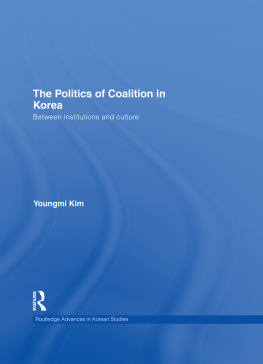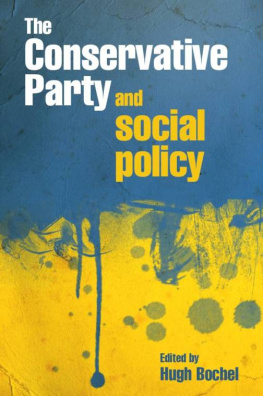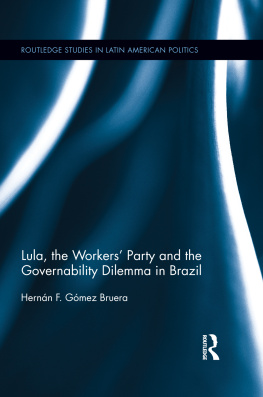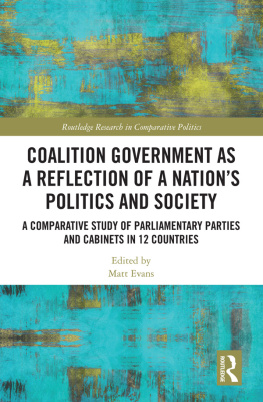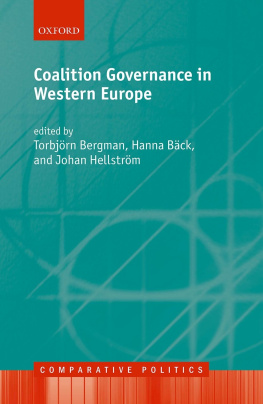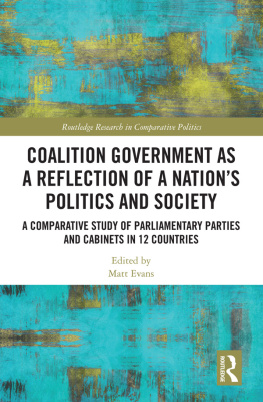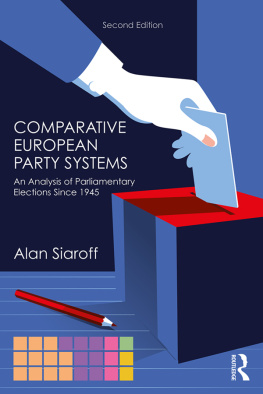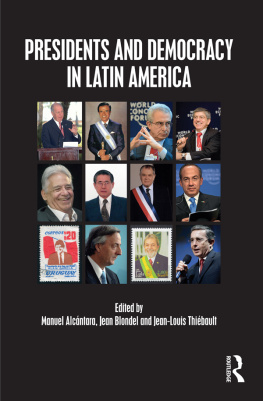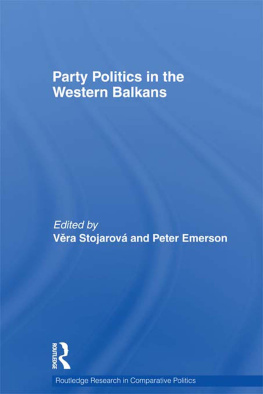The Politics of Coalition in Korea
This book examines how inter- and intra-party coalition-building affects governability in South Korea. Focusing on the Kim Dae-jung administration (1998 2003) as a case study in the failure of a government to turn electoral success into stable governability, or ability to implement reform policies, the books research draws on two bodies of literature which, though focusing on the same dependent variable (cabinet or government stability), have rarely been used in tandem: coalition research on parliamentary systems and studies of divided government in presidential systems.
Youngmi Kim argues that a weak institutionalization of the ruling party and the party system accounts for political instability and inefficient governability in Korea and, in doing so, her study makes a number of key contributions to the field. Theoretically it proposes a framework that integrates a rationalist approach with one that acknowledges the role of political culture. It further enhances the understanding of factors affecting governability after coalition-building across regime types and aims to build on recent demands for broader cross-regime analysis of minority/divided government and of the determinants of governability. This has important comparative implications as coalition-building within (semi-)presidential systems has occurred in other post-authoritarian contexts. The book finally provides a new data set that fills a gap in a field where Western cases constitute the main focus of research.
The Politics of Coalition in Korea will be of interest to students and scholars of Korean studies, Korean politics, Asian studies and Asian politics.
Youngmi Kim is an Assistant Professor in the Department of Public Policy, and International Relations and European Studies at Central European University, Hungary.
Routledge Advances in Korean Studies
1 The Politics of Economic Reform in South Korea
A fragile miracle
Tat Yan Kong
2 Market and Society in Korea
Interest, institution and the textile industry
Dennis McNamara
3 Social and Economic Policies in Korea
Ideas, networks and linkages
DongMyeon Shin
4 North Korea in the World Economy
Edited by E. Kwan Choi, Yesook Merrill and E. Han Kim
5 Legal Reform in Korea
Edited by Tom Ginsburg
6 Women, Television and Everyday Life
Journeys of hope
Youna Kim
7 Transformations in TwentiethCentury Korea
Edited by Chang YunShik and Steven Hugh Lee
8 The Development of Modern South Korea
State formation, capitalist development and national identity
Kyong Ju Kim
9 Industrial Relations in Korea
Diversity and dynamism of Korean enterprise unions from a comparative perspective
Jooyeon Jeong
10 The Global Korean Motor Industry
The Hyundai Motor Companys global strategy
Russell D. Lansbury, ChungSok Suh and SeungHo Kwon
11 Korean Workers and Neoliberal Globalisation
Kevin Gray
12 Korea in the New Asia
East Asian integration and the China factor
Francoise Nicolas
13 Foreign Direct Investment in PostCrisis Korea
European investors and mismatched globalization
Judith Cherry
14 Korea Confronts Globalization
Edited by Chang YunShik, Hyunho Seok and Donald L. Baker
15 Koreas Developmental Alliance
State, capital and the politics of rapid development
David Hundt
16 Capitalist Development in Korea
Labour, capital and the myth of the developmental state
Daeoup Chang
17 Political Protest and Labour Movements in Korea
Solidarity among Korean whitecollar workers
Doowon Suh
18 Retirement, Work and Pensions in Ageing Korea
Edited by Jaejin Yang and Thomas R. Klassen
19 South Korea Under Compressed Modernity
Familial political economy in transition
KyungSup Chang
20 New Millennium South Korea
Neoliberal capitalism and transnational movements
Edited by Jesook Song
21 Human Rights Discourse in North Korea
Postcolonial, Marxist and Confucian perspectives
Jiyoung Song
22 Digital Development in Korea
Building an information society
Myung Oh and James F. Larson
23 The Politics of Coalition in Korea
Between institutions and culture
Youngmi Kim
First published 2011
by Routledge
2 Park Square, Milton Park, Abingdon, Oxon OX14 4RN
Simultaneously published in the USA and Canada
by Routledge
711 Third Avenue, New York, NY 10017
Routledge is an imprint of the Taylor & Francis Group, an informa business
2011 Youngmi Kim
The right of Youngmi Kim to be identified as author of this work has been asserted by her in accordance with the Copyright, Designs and Patent Act 1988.
All rights reserved. No part of this book may be reprinted or reproduced or utilized in any form or by any electronic, mechanical, or other means, now known or hereafter invented, including photocopying and recording, or in any information storage or retrieval system, without permission in writing from the publishers.
Trademark notice: Product or corporate names may be trademarks or registered trademarks, and are used only for identification and explanation without intent to infringe.
British Library Cataloguing in Publication Data
A catalogue record for this book is available from the British Library
Library of Congress Cataloging in Publication Data
Kim, Youngmi.
The politics of coalition in Korea : between institutions and culture /
Youngmi Kim.
p. cm. (Routledge advances in korean studies)
Includes bibliographical references and index.
1. Coalition governmentsKorea (South) 2. CoalitionsKorea (South)
3. Korea (South)Politics and government. I. Title.
JQ1729.A795K56 2011
320.9515dc22
2010041744
ISBN: 978-0-415-56215-7 (hbk)
ISBN: 978-0-203-82113-8 (ebk)
Acknowledgements
This book stems from the support of several institutions and people. The book is derived, originally, from my PhD research; I am profoundly grateful to my former supervisor, Professor Glenn D. Hook, at the School of East Asian Studies, University of Sheffield, for his advice, insights, encouragement and patience throughout my doctoral career. I consider myself very lucky and privileged in meeting and working with him during my PhD. I was fortunate to find in Professor Charlie Jeffery a supportive and patient mentor, and in the University of Edinburgh a wonderful institution.
Many in Korea have also made a great contribution to this project before and during my fieldwork there, in particular Professor Kim Byung-kook at Korea University and the East Asia Institute (EAI). I am especially grateful to him for generously allowing me to use the raw data from the EAI Social and Political Surveys for my research.
The University of Sheffield and the Korea Foundation provided financial support; without their help it would not have been possible to complete my dissertation, and from there to move on to an academic career at the University of Edinburgh, University College Dublin and Central European University (CEU) in Budapest. The ESRC Post-Doctoral Fellowship, the Leverhulme Trust Early Career Research Fellowship allowed me to further develop my research in coalition-party politics more broadly in East Asia. My new institutional home, CEU, made it possible for me to focus on finalizing this book. I am also grateful to the British Academy, the Korea Foundation, the Japan Foundation, the Economic and Social Research Council and the University of Edinburgh which all supported the organization of a workshop and a conference in 2007. Part of the research on governability across regime types owes a lot to that workshop and all those who contributed, and especially professors Fiona Yap, Junko Kato, Robert Elgie, Jose Antonio Cheibub and Carol Mershon; part of examines most recent developments in the latest two administrations up until 2010. Part of it was published as a book chapter in the

